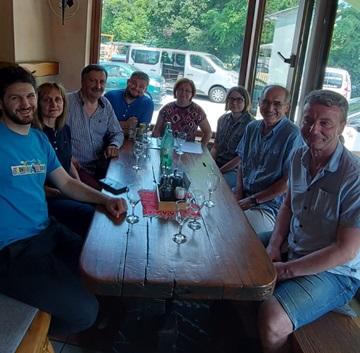Abstract
Molecular magnets represent an ideal playground for physiciststo study classical and quantum magnetism due to the intrinsic quantum properties of electron spin and the possibility of influencing it through chemical synthesis. Namely, physical properties such as magnetic anisotropy, spin interactions, phase transitions, spin-crossover, relaxation times, diffusivities, and molecular dynamics could be modified by using appropriate ligands, coordination ions, diluting spin centers, changing solvent polarity, and introducing reinforcing agents to polymer matrices. Therefore, the essential step in molecular magnetism, between chemical design and spin control in devices, lies in understanding spin properties related to structural and dynamical properties. Due to the continuous search for new multifunctional materials, many different solid and soft molecular magnetic compounds have been synthesized. In this project, we will investigate selected advanced materials concerning their potential application for storage, spintronics, biology, charge transport, and “green” fillers in polymers, as w ell as because of their unconventional magnetic properties. Our focus will be on transition metal compounds, MOFs, paramagnetic molecules in liquids, and polymer-zeolite composites. The primary experimental technique w ill be electron spin resonance (ESR) spectroscopy as an ideal tool for obtaining insights into the local properties of spin centers and a microscopic picture of interactions. Besides standard X-band CW spectroscopy, we will use advanced ESR techniques such as pulse, ENDOR, and multifrequency high-field ESR. These results will be supported by those obtained by X-ray diffraction, magnetometry, DSC, and SEM. The experimental results w ill be interpreted based on the spin-Hamiltonian approach, physical models, and DFT computations. Beyond the fields of molecular magnetism, the project’s results may also influence the area of coordination chemistry and quantum technologies.
Web page https://www.irb.hr/moment
X (Twitter) account @hrzz_moment
Associated publications https://www.croris.hr/projekti/projekt/9416?lang=en
NEWS
--------------------2024--------------------
-Kick-off-meeting 25.01.2024. at RBI
-HF-ESR experiments at Leibniz IFW Dresden (21.02.-01.03. 2024.)
-Dijana Žilić gave lecture at 9th International Conference on Superconductivity and Magnetism, Fethiye, Turkey, 29.04.2024. Photo: icsmforever.org (CC BY-NC-ND 4.0)
-Miroslav Peric and Dalibor Merunka with collaborators published article in Journal of Molecular Liquids
-Dijana Žilić with collaborators published article in Dalton Transaction
-Working lunch of MOMENT members, including prof. Peric from California State University, on 6.6.2024.
-Boris Rakvin and Jurica Jurec published article in Applied Magnetic Resonance
-Lucija Vujević participated with poster at XIIth Conference of the European Federation of EPR groups
-Darko Vušak, Jurica Jurec and Dijana Žilić with collaborators published article in Molecules
--------------------2025--------------------
-On 08.01.2025. Lucija Vujević defended her PhD thesis "The study of metal-organic frameworks by electron paramagnetic resonance spectroscopy".
- Dijana Žilić gave invited lecture at European COST action CA21144 SuperQumap conference on: Superconducting Nanodevices and Quantum Materials for Coherent Manipulation: Topological states in superconductors and magnetic materials, in Liblice, Chech Republik, 06.05.2025. Photo: CA21144 (CC BY-NC-ND 4.0)
- Dalibor Merunka and Dijana Žilić gave lectures at XXIX International EPR Seminar, in Modra, Slovakia, 14.05.2025. Photo: fchpt.stuba.sk (CC BY-NC-ND 4.0)
- 22.05.2025. Open postdoctoral position at MOMENT!!! Application deadline June 23, 2025! Details can be found here https://euraxess.ec.europa.eu/jobs/346364
-HF-ESR experiments at Leibniz IFW Dresden performed by Jurica Jurec 26.05.-06.06. 2025. Dijana Žilić visited Leibniz IFW Dresden 02.-03.06.2025.
-Visit of Prof. Miroslav Perić from California State University as a MOMENT team member to the Laboratory for Magnetic Resonances at Ruđer Bošković institute 27.05.-21.06.2025.
-Working lunch of MOMENT members, including prof. Peric from California State University, on 12.06.2025.
- Dijana Žilić gave invited lecture at Gordon Research Conference: Rigorous Application of the Scientific Method to Molecular Structure, Reactivity, and Dynamics, in Holderness, New Hampshire, United States, 25.06.2025. Photo: © 2025 Gordon Research Conferences (CC BY-NC-ND 4.0)
- Dijana Žilić and Jurica Jurec were members of Organizing Board of Solid State Science & Research - SCIRES 2025 conference held in Zagreb, Croatia 02.-04.07.2025. Lucija Vujević gave Junior invited talk presenting results from MOMENT project. Photo: SCIRES 2025 (CC BY-NC-ND 4.0)
-The Elexsys system has been upgraded with two software: SpinCount and SpinFit for Liquids. SpinCount allows direct conversion of the measured EPR signal into the desired concentration of radicals or transition metal ions. SpinFit for Liquids is used to simulate and fit CW-EPR spectra of liquid samples in three dynamic regions: (1) isotropic limit, (2) fast motion, and (3) slow motion. The upgrade was funded by the project MOMENT HrZZ-IP-2022-10-9292 and Europe Union – NextGenerationEU.
- Lucija Vujević and Dijana Žilić with collaborators published article "Vanadium(IV) complexes of acetophenone isoniazid hydrazones: Synthesis, characterization, stability assay, antidiabetic activity, histopathology and bioaccumulation" in Journal of Inorganic Biochemistry!
-Darko Vušak, Jurica Jurec and Dijana Žilić with collaborators published article "A Design of Copper(II) Coordination Polymers with L-Homoserine: Structural, Spectroscopic, and Biological Studies" in ACS Omega!
- 26.09.2025. Open Doctoral student (assistant) position at MOMENT!!! Application deadline October 27, 2025! Details can be found here https://euraxess.ec.europa.eu/jobs/376640
- Dalibor Merunka and Miroslav Perić with collaborators published article "A Study of Heisenberg Spin Exchange in Paramagnetic Ionic Liquids" in The Journal of chemical physics!
- Tatjana Antonić Jelić, Dalibor Merunka, Jurica Jurec and Srećko Valić with collaborators published article "The Effect of Zeolite Morphology and Loading on the Local Segmental Dynamics and Crystallisation Behaviour of PDMS–Zeolite Composites" in Polymers.
- PhD Miroslava Lukešová, from 12. November 2025., joined MOMENT team as PostDoc! Welcome Mirka!
- New PhD student David Kučera-Čavara started to work at Laboratory for Magnetic Resonances at RBI from 18.12.2025. and joined MOMENT team. Welcome David!
RBI members of MOMENT team: Srećko, Tanja, David, Miroslava, Jurica, Dalibor and Dijana
- New equipment-benchtop EPR spectrometer arrived at RBI 17.12.2025!


















